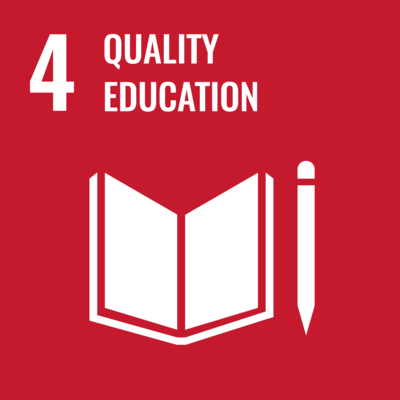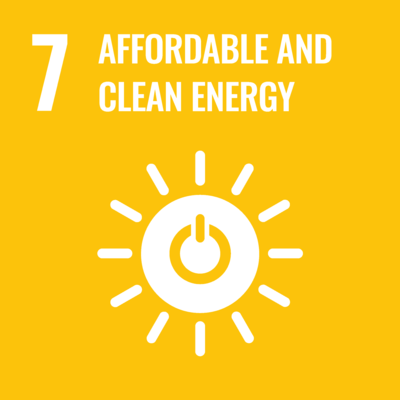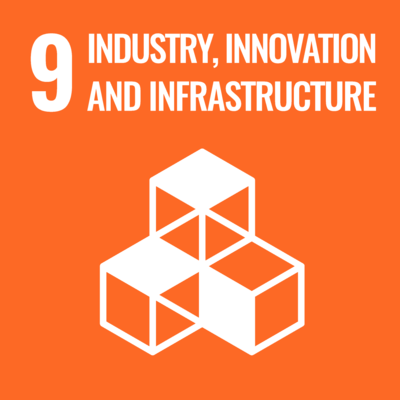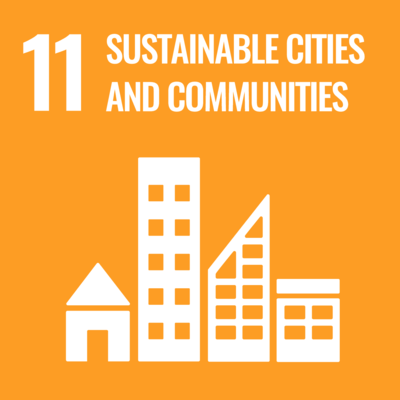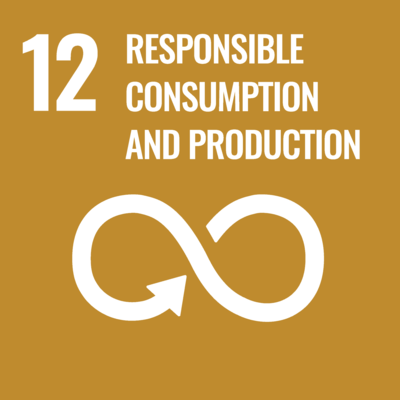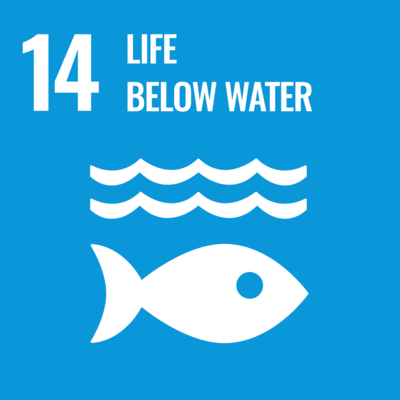SDG 16.3.2 Policy- and lawmakers outreach and education
NCUE faculty members actively assist policymakers and lawmakers by providing outreach activities and courses relating to sustainable development (SDG) concepts such as economics, law, technology, migration, displacement, and climate change. The NCUE faculty members in relevant professional fields serve as advisory members to government agency committees and help implement the agencies’ plans. They ensure that the policymakers and lawmakers recognize and understand the sustainable development concepts and guide them in finding feasible strategies and specific actions toward achieving the United Nations’ 2030 SDGs.
1. In 2022, 30 faculty members from NCUE executed a total of 13 government department projects. In 2023, this increased to 21 faculty members executing a total of 22 government department projects. The details are as follows:
(1) Four faculty members assisted with four projects under the "Economy" theme:
(a) Professor Peng Chih-Wei from the Department of Accounting is executing a National Science and Technology Council project from 2023/08/01 to 2025/01/31, titled “How Does Organization Identification Affect ESG Performance and Disclosure Quality?”
The implementation of Corporate Governance 3.0 in Taiwan strengthens listed companies’ capacity to advance the quality of reports disclosing ESG information. However, there are divergent views in academic literature and practice regarding why companies should engage in ESG activities and improve ESG disclosure quality.
This project attempts to examine, from an organizational behavior perspective, how organizational identification influences ESG performance and disclosure decisions of listed companies in Taiwan. The project aims to fill gaps in the literature, and the research findings are expected to provide valuable references for regulatory authorities in formulating industry policies.
(b) Professor Pai Feng-yun from the Department of Business Administration is executing a National Science and Technology Council project from 2023/08/01 to 2025/01/31, titled “Resilience under Covid-19 Epidemic- Building Supply Chain Resilience in Bicycle Manufacturing Industry.”
In recent years, supply chains have often been disrupted due to natural disasters and human-made events. Taiwan's bicycle industry, which heavily relies on foreign partners, has been deeply affected by the COVID-19 pandemic that broke out in 2020. Supply chain resilience not only enables companies to detect supply risks and respond to supply disruption events but also to recover quickly from these events. This project analyzes how the bicycle industry can build supply chain resilience and examines the impact of supply chain resilience on operational performance.
(c) Professor Juan Yu-lin of the Department from Electrical Engineering is executing a National Science and Technology Council project from 2023/08/01 to 2024/07/31, titled “Development of a two-phase parallel wireless battery charging system for electric scooters.”
The key research outcomes of this project include multi-phase parallel design for wireless chargers, phase-switching control to enhance light-load efficiency, hybrid resonant compensation, and coil misalignment compensation. In terms of social and economic impact, these advancements can provide relevant industries with technologies for wireless charging systems, coil design, and efficiency improvements, enhancing autonomous research and development capabilities. It will also help promote the application of wireless charging technology in electric vehicles, responding to the government's energy-saving and carbon-reduction policies.Academically, it is expected to secure patents, publish research results in international journals, and train graduate students in the final stage of the project.
(d) Associate Professor Chen Ching-mu from the Department of Geography is executing a National Science and Technology Council project from 2022/08/01 to 2023/07/31, titled “Life Cycle Assessment of Pig Production with Biogas Utilization: The Case Study in Changhua.”
The pig farming industry meets human dietary needs for animal protein. However, with the rise of environmental awareness, the public is increasingly holding livestock production to higher standards. As environmental impact assessment methodologies have evolved—from carbon and water footprints to the environmental footprint now promoted by the European Union—their application has expanded beyond manufacturing to a wide range of industries. These environmental footprints use life cycle assessment for systematic analysis, compiling and evaluating the inputs, outputs, and potential environmental impacts throughout a product system's life cycle, from raw material acquisition to final disposal. This research applies these advanced methodologies to analyze the environmental impact of biogas reuse in pig farming, taking those farms in Changhua County as a case study. The findings are expected to provide valuable insights for sustainable practices in the livestock industry and inform policy-making for environmental protection in agricultural sectors.
(2) Two faculty members are contributing to projects under the "Law" theme:
(a) Professor Chang Wen-ching from the Department of Accounting is executing a National Science and Technology Council project from 2023/11/01 to 2024/10/31, titled “Does Litigation Experience Improve Audit Partners’ Audit Quality?”
In audit academic research, Chy et al. (2021) called for future studies to explore the relationship between the legal environment and auditor behavior. This study responds to their call by providing new evidence. It also adds to the empirical evidence supporting the "litigation avoidance" theory (Khurana and Raman 2004). There is little empirical evidence on whether the litigation system can prompt negligent parties to improve their audit quality. Moreover, current audit litigation literature only provides evidence at the accounting firm or branch level (Lennox and Li 2014; Schmidt 2009). This study extends this evidence to the level of individual partner accountants. Regarding practical implications, when investors evaluate an auditor’s audit quality, they should not only consider their past error records but also gather information on any disciplinary actions (such as lawsuits) they have faced. This comprehensive approach will help assess potential changes in their future audit quality.
(b) Associate Professor Li Huan-yi of the Department of Accounting is leading a National Science and Technology Council project from August 1, 2023, to June 30, 2025, titled "The Effects of the Implementation of Act for the Development of Biotech and Pharmaceutical Industry and the amendment to Statute for Industrial Innovation on Firm Innovation, Investment Efficiency, and Firm Value.
Implemented in 2022, the Act for the Development of Biotech and New Pharmaceuticals Industry has incorporated biotech contract manufacturing into the scope of tax incentives, added equipment investment deductions, and included subsidies for advanced medical technologies. Since its implementation in 2010, the Statute for Industrial Innovation has undergone multiple amendments. The tax incentives provided by these two acts have played an important role in the R&D investment and industrial development of Taiwanese enterprises. This project will analyze the impact of the implementation of the Act for the Development of Biotech and New Pharmaceuticals Industry and significant amendments to the Statute for Industrial Innovation on the innovation, investment efficiency, and company value of listed companies in Taiwan. The research results can serve as a reference for the government in formulating tax policies related to investment deductions and for corporate tax management.
(3) Nine faculty members assisted with nine projects under the "Technology" theme:
(a) Professor Liu Min-ying of the Department from Chemistry is executing a National Science and Technology Council project from 2023/08/01 to 2024/12/31, titled “Investigation of the binding reactions between oxidized 1-palmitoyl-2-arachidonoyl-sn-glycero-3- phosphocholine and human apolipoproteins by low-flow capillary electrophoresis-mass spectrometry.”
The purpose of this research is to investigate the binding reaction between oxidized PAPC and human high-density lipoprotein carrier proteins. We will use low-flow capillary electrophoresis-mass spectrometry analysis and cyclodextrin-capillary micellar electrokinetic chromatography to analyze the binding products. We have recently successfully developed these two analysis methods. In this study, low-flow capillary electrophoresis-mass spectrometry analysis will be used to investigate oxidized PAPC and binding products, while cyclodextrin-capillary micellar electrokinetic chromatography will be used to investigate high-density lipoprotein carrier proteins and binding products. We hope this research can discover which carrier proteins bind with oxidized PAPC. At the same time, we also hope this research can help people understand the biochemical activity of oxidized PAPC products and related pathological processes.
(b) Associate Professor Chou Chih-pin of the Department of Physics is executing a National Science and Technology Council project from 2023/08/01 to 2024/07/31, titled “The Materials Research Platform: an open database for crystal surface and 2D material catalyst (1/3).”
The goal of the U.S. Materials Genome Initiative (MGI) is to accelerate the discovery, design, and deployment of materials through a high-throughput, integrated approach combining experiments, theory, and computation. This approach facilitates the creation, analysis, and sharing of large materials datasets, enabling scientific researchers to collaborate across traditional boundaries to discover properties that determine material function, and significantly reduce the time required to deploy new materials. The first phase of MGI has concluded, having a significant impact on scientific and engineering research in various fields including medicine, energy, catalysis, and computation. With the development of databases, opportunities for exploring material design using computers are now ubiquitous. Through data-driven integrated efforts in experimental, theoretical, and computational applications, we can reveal the inherent structure-function relationships that constitute the materials genome.
(c) Assistant Professor Chang Chin-fa of the Department from Electronic Engineering is executing a National Science and Technology Council project from 2023/08/01-2025/01/31, titled “Ultra-Wideband RF Front-End Modules and Key Components Integrated Transceivers of Tens of Gigabits Per Second for Next Generation Communications.”
This project proposes a new uniform wireless transceiver architecture, wideband transceiver frontend module, and its key sub-circuits for multi-terabit/s applications. Compared to recent literature, this design is relatively cost-effective and performance-enhancing. This next-generation wireless transceiver system and circuit are applied to high-speed transmission and low-latency systems such as UWB, K/Ka-band satellite/automotive collision avoidance radar systems, 5G NR, and WiFi 7 communications. In addition, this project proposes innovative wideband, low-power, and high-performance sub-circuit architectures, such as low-noise variable gain wideband amplifiers, power amplifiers, switches, power dividers/combiners, etc. It is expected to publish papers and patents on the above communication systems and innovative sub-circuits, with the goal of transferring some of the results to IC companies.
(d) Professor Chang Yu-chung of the Department from Electronic Engineering is executing a National Science and Technology Council project from 2023/08/01 to 2025/02/28, titled “Efficient Point by Point Inscription of Chirped Fiber Bragg Grating.”
This research project uses point-by-point laser photolithography to produce chirped fiber Bragg gratings (CFBG), developing a platform suitable for stretchers and compressors in ultrafast fiber lasers. It can customize small quantities of diverse CFBGs to meet the needs of various ultrafast fiber laser structures. Compared to using phase masks to produce CFBGs, which requires time-consuming remake of photomasks when parameters change, this method is more efficient. Currently, the key technologies for domestic ultrafast fiber lasers and their components are controlled by other countries. Establishing this research and development capability can enhance our country's ability to develop and produce key components, strengthening our fundamental research capabilities and international competitiveness in pulsed laser sources over time.
(e) Associate Professor Chang Chia-chi from the Department of Computer Science and Information Engineering is executing a National Science and Technology Council project from 2023/11/01 to 2024/10/31, titled “Design and Implementation of Ultra-Low Power Electronic Tags with Multi-Protocol.”
This research project aims to implement two devices: (1) Multi-Protocol Electronic Ink Label (MPEiL) and (2) 6LoWPAN Border Router. The MPEiL combines TI SimpleLinkTM CC2652P with a 13.3-inch electronic ink screen and low-power technology patented in the United States, representing the embodiment of the patent invention and challenging the research team's implementation skills. Students participating in the project will become familiar with microprocessor architecture, firmware program development techniques, and gain in-depth understanding of wireless communication protocols such as ZigBee/BLE/6LoWPAN, potentially elevating the domestic level of wireless communication technology.
(f) Associate Professor Lin Chao-chih from the Department of Electrical Engineering is executing a National Science and Technology Council project from 2023/08/01 to 2024/10/31, titled “Simultaneous Wireless Communication and Wireless Charging Smart Door Lock Systems.”
This project researches RF wireless power transmission, combining multiple-input multiple-output, beamforming, receiver energy combining, and technology for simultaneous wireless communication and power transmission. The project integrates the latest technologies from multiple fields. If this system can be realized, it will not only enhance domestic research results in RF wireless power transmission but also promote the development of smart lock and related industries.
(g) Professor Lo Chun-hsu of the Department of Mechatronic Engineering is executing a National Science and Technology Council project from 2023/08/01 to 2025/07/31, titled " Coplanar microstrip circular arrays for pattern reconfigurable antenna designs and angle of arrival estimation systems ".
This project proposes a coplanar microstrip circular array that, when applied to beam-switching antennas, can achieve miniaturization, broadband, high-gain, and multi-beam designs, meeting various requirements for wireless communication base station antennas. Additionally, a null-scanning antenna can be realized through a set of circular arrays, which can be further developed into an azimuth estimation system covering the entire horizontal plane, suitable for IoT applications. All completed products from the project can also serve as equipment for teaching and research on antenna. Project participants will gain comprehensive understanding of antenna fabrication techniques, measurements, and system integration, enhancing their appreciation of the role antennas play in wireless communication systems. These outcomes will contribute to improving domestic wireless communication R&D capabilities.
(h) Assistant Professor Huang Yao-hsien from the Department of Computer Science and Information Engineering is executing a National Science and Technology Council project from 2023/08/01 to 2024/07/31, titled “Self-supervised Learning Computer-aided Multi-tissue Annotation and Pancreas Staging System on the Computed Tomography.”
Technological advancements have enriched medical imaging data but also increased the burden on medical personnel. Computer-aided systems are auxiliary tools to assist medical staff, and many research results have demonstrated that computer-aided systems based on deep learning architectures have excellent capabilities in medical imaging tasks. Therefore, this project will use deep learning architectures as a foundation, employing self-supervised learning strategies and attention mechanisms to complete an intelligent multi-tissue annotation and pancreatic cancer grading system. In terms of research outcomes, we aim to demonstrate our research capabilities and expand our international standing through academic presentations at international conferences and journal publications. Economically, we hope that the developed system can improve patient survival rates and reduce costs. Socially, complementing academic publications, we aim to highlight our technical strength, hoping to collaborate with domestic hospitals for clinical experiments to verify system robustness and improve system performance, advancing the development of intelligent healthcare and cloud-based solutions.
(I) Professor Huang Wei-tze of the Department from Industrial Education and Technology is executing a National Science and Technology Council project from 2023/08/01 to 2026/07/31, titled “Study on Reconfigurable Networked Microgrids for Enhancing Operation Performance and Resilience of Regional Distribution Networks.”
In response to the instability of power systems both domestically and internationally caused by the high penetration of renewable energy, this project applies the concept of reconfigurable networked microgrid operations to improve distribution network operational efficiency and enhance operational resilience. Each microgrid not only possesses self-sufficiency capabilities but can also assist in regulating power within the distribution network through the public grid. Furthermore, the optimal modes and strategies established for normal operations and contingency scenarios of networked microgrids can provide relevant applications and research for industry, government, and academia. This will support governmental efforts to promote private microgrids and the deployment and application of distribution networks operating as networked microgrids, creating a win-win situation for both power supply and demand sides.
(4) One faculty member is contributing to a project under the "Immigration and Displacement" theme:
Professor Wang Yi-han of the Department from Guidance and Counseling is executing a National Science and Technology Council project from 2023/08/01 to 2025/07/31, titled “The experiences of social participation and empowerment of female new immigrants and an Action Research practice: The case of new immigrant organizations.”
This research has two main focuses:
(a) To explore the social participation and empowerment experiences of new immigrant women in Taiwan, using new immigrant groups as case studies.
(b) To identify factors and methods that promote the empowerment of new immigrant women in social participation. Based on the findings, the study will collaborate with new immigrant groups to develop an empowerment program aimed at enhancing social participation.
The expected outcomes of this research are:
(a) Enriching the academic research landscape.
(b) Leading empirical research and practical fields to focus on social participation and empowerment work for new immigrant women.
(c) Serving as a reference for relevant units in planning and implementing empowerment programs for new immigrant groups or new immigrant women in the future.
(d) Contributing to promoting social participation, diversifying empowerment experiences, and maintaining the rights and well-being of new immigrant women in Taiwan.
This study addresses important issues related to the integration and empowerment of immigrant women, which is crucial for fostering an inclusive society and ensuring the well-being of diverse populations.
(5) Five faculty members assisted with six projects under the "Climate Change" theme:
(a) Assistant Professor Wu Chia-hsuan from the Master's Program in Applied Artificial Intelligence Technologies is executing a National Science and Technology Council project from 2023/02/01 to 2024/01/31, titled “Designe of a solar power system with ripple compensation and batteries voltage controllable functions.”
This project proposes a solar power generation system that integrates both ripple compensation and energy storage battery voltage control functions. It focuses on controlling a solar AC power supply system with a parallel energy storage architecture. The project uses a proposed ripple compensation and power control device, along with maximum power point tracking to store excess energy provided to AC loads in batteries. Simultaneously, this device compensates for low-frequency harmonics generated by the inverter, allowing solar modules to operate stably at the maximum power point. The project employs a battery voltage regulation converter to adjust the battery pack voltage, reducing the voltage difference between solar modules and battery packs, thus lowering the current stress requirements on the converter. Additionally, during nighttime operation, the system uses the battery voltage regulation converter to provide sufficiently high voltage from the battery pack directly through the inverter to AC loads, achieving higher system energy conversion efficiency. Finally, the project will complete a 900W prototype to verify the aforementioned functions.
(b) Professor Tu Chien-yi of the Department from Geography is executing a National Science and Technology Council project from 2023/08/01 to 2024/07/31, titled “Impacts of Large-scale Circulation Changes on Precipitation in the Asian Monsoon Region under Global Warming (II).”
Taiwan is located in one of the world's most significant monsoon regions. The long-range moisture transport associated with the vigorous southwest airflow in summer often brings abundant precipitation to Taiwan, sometimes leading to disasters. Therefore, understanding the long-term changes in the monsoon system is crucial. This project plans to start with observational data analysis and extend to evaluating the potential impacts of Asian monsoon circulation changes on regional rainfall under future warming scenarios. The research results will help us further understand the potential effects of monsoon circulation changes on precipitation in monsoon regions and assist in future disaster prevention and water resource allocation in Taiwan.
(c) Professor Wang Su-fen of the Department from Geography is executing a National Science and Technology Council project from 2023/08/01 to 2024/07/31, titled “Constructing an evaluation framework for large-scale landscape changes and ecosystem services using remote sensing (2/3).”
This project focuses on the impact of land-use changes on ecosystem services. By using remote sensing as a tool to quantify the relationship between land-use changes processes and ecosystem services, the project aims to provide a basis for future estimates of converting ecological function values into economic output. Applying remote sensing technology to establish methods for estimating ecosystem services is suitable for large-scale spatial assessments. Integrating the technique of interpreting multi-temporal images can capture dynamic changes in land cover classification, more accurately quantifying the environmental impact caused by land-use patterns. Assessing the ecological value of agricultural and fishery lands and natural wetlands can ensure the maintenance of domestic agricultural production and local industrial patterns. Moreover, recognizing ecological benefits that lack direct economic value can provide estimates of potential hidden environmental costs caused by development. This approach connects with other subprojects to introduce scientific data into local communities and governments, strengthening the practical application of academic knowledge and avoiding inappropriate land-use development.
(d) Professor Wang Su-fen of the Department from Geography is leading a National Science and Technology Council project from 2023/10/01 to 2024/09/30, titled “Monitoring of the Farming and Fishery Social Ecosystem in the Wetlands of the Western Coast of Taiwan (3/3).”
This project aims to establish long-term ecological observation core data for the social-ecological systems of semi-agricultural and semi-fishing communities along Taiwan's southwestern coast for future research use. By conducting issue inventories and collecting long-term and multifaceted core data, the project seeks to understand long-term social-ecological changes and human-environment interactions. Moreover, by establishing a data-sharing platform for research results, the project aims to reduce data collection costs and attract more research investment.
(e) Associate Professor Lu Pei-wen from the Department of Geography is leading a National Science and Technology Council project from 2023/08/01 to 2024/07/31, titled “Climate resilient development and adaptive governance: framing just transition into a participatory policymaking approach.”
The project focuses on shaping a participatory approach with just transition to develop climate resilience in new ways, within the scope of disaster prevention and adaptation governance. From an academic standpoint, the project will conduct a systematic analysis of the concept of just transition, establishing methods to implement it in climate decision-making services through international research collaborations and case studies in Taiwan. For national development, it aims to identify gaps in adaptation governance by fostering interdisciplinary alliances among subprojects and seeking Nature-Based Solutions (NBS) to enhance climate resilience in response to the climate emergency.
(f) Associate Professor Chen Yi-ching from the Department of Geography is executing a National Science and Technology Council project from 2023/08/01 to 2024/07/31, titled “Monitoring Geomorphic Change and Environmental Controls of the Tidal Flat in the Changhua Coast using Multi-scale Remote Sensing (2/3).”
Tidal flat topography is a crucial foundation for Changhua's coastal ecological and agro-fishing social systems. This project will utilize multi-scale aerial remote sensing techniques to map changes in the tidal flat topographic along in Changhua's coast over the past 30 years and access the impact of natural environmental changes and artificial structures (such as sea bridges, mangroves, wind farms and solar power facilities) on tidal flat topography. The expected outcomes include: i. Development of modules for coastal shoreline interpretation and topographic mapping; ii. Establishment of 30-year long-term coastal topographic dataset, detailing the spatial distribution of coastal erosion and deposition in Changhua; iii. Analysis of the correlation between tidal flat topography and river sediment transport, and the impact of artificial structures on coastal topography; iv. Creation of high-resolution digital terrain models of nearshore coasts using drone photogrammetry to analyze the impact of mangroves on tidal flat topography; v. Integration of natural ecological and human social aspects to to access the impacts on climate change and artificial structure , providing a basis for understanding social-ecological resilience and vulnerability of Changhua county's coast.
2. In 2022, three faculty members from NCUE served as committee members for government agencies. In 2023, three more faculty members joined the list, for a total of six serving on seven government committees. These faculty members provide policymakers with recommendations for practical strategies and concrete actions to achieve specific sustainable development goals:
(1) Professor Wei-Tzer Huang from the Department of Industrial Education and Technology serves as a member of the Electric Reliability Council of the Ministry of Economic Affairs, participating in meetings concerning Taiwan’s long-term power load forecasting, renewable energy development, and power system operation reliability.
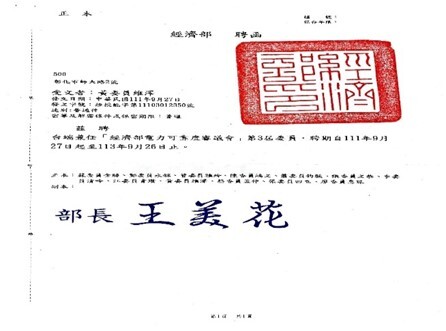
Figure 1: Professor Wei-Tzer Huang serves as a member of the Electric Reliability Council of the Ministry of Economic Affairs
(2) Professor Chung-Chi Lin from the Department of Biology serves as the executive director of the National Red Imported Fire Ant Control Centre of the Council of Agriculture and is responsible for planning and implementing professional technical support and emergency control plans. The National Red Imported Fire Ant Control Centre was established in November 2004 to provide overall notifications and control actions on RIFA infestations. The Centre also researches effective monitoring methods and control strategies suitable for Taiwan’s ecological environment, cooperates with communal and non-governmental organizations to educate the public about the problems, and helps train seeded teachers to help the government mitigate the spread of RIFAs.
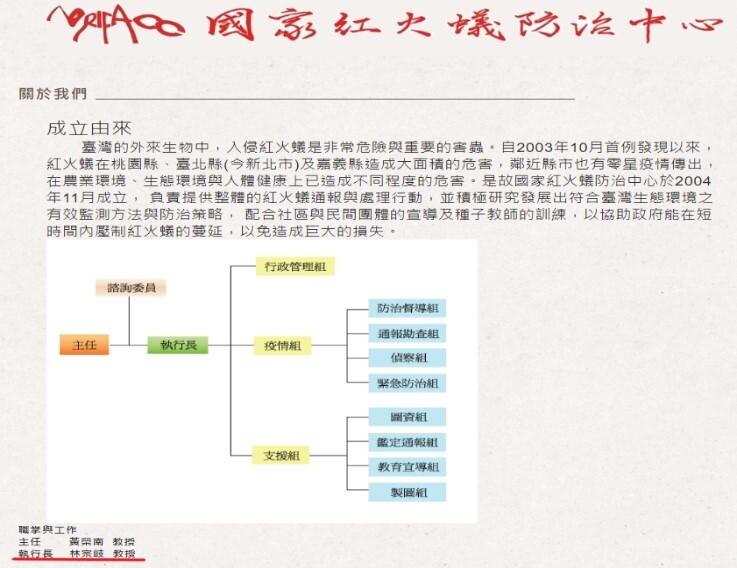
Figure 2: Professor Chung-Chi Lin serves as the executive director of the National Red Imported Fire Ant Control Centre of the Council of Agriculture
(3) Associate Professor Lu Pei-wen from the Department of Geography serves as a committee member on the National Spatial Planning Council, the Ministry of the Interior. In this role, she contributed to: Reviewing the drafting or modification of national spatial plans, Evaluating national defense and major public facility or public utilities that span more than two national land functional zones, Soliciting opinions for the national land white paper, Reviewing and improving the national spatial plan, and Addressing other matters related to the deliberation or coordination of national spatial planning (Figure 3). Relevant URL:
https://www.nlma.gov.tw/%E5%AF%A9%E8%AD%B0%E5%A7%94%E5%93%A1%E6%9C%83/%E5%85%A7%E6%94%BF%E9%83%A8%E5%9C%8B%E5%9C%9F%E8%A8%88%E7%95%AB%E5%AF%A9%E8%AD%B0%E6%9C%83/287-%E5%85%A7%E6%94%BF%E9%83%A8%E5%9C%8B%E5%9C%9F%E8%A8%88%E7%95%AB%E5%AF%A9%E8%AD%B0%E6%9C%83/37869-
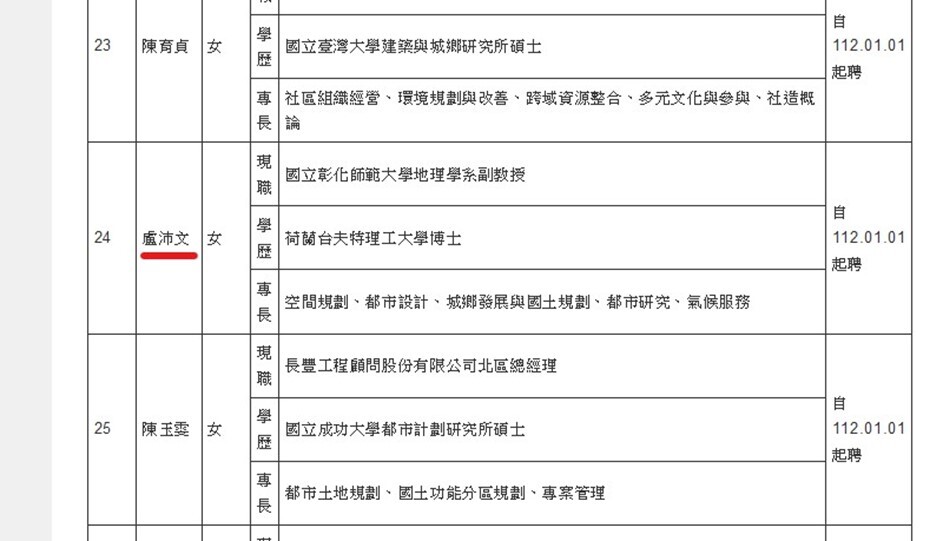
Figure 3: Documentation of Associate Professor Lu Pei-wen's appointment as a committee member of the National Spatial Planning Council, Ministry of the Interior
(4) Associate Professor Lu Pei-wen of the Department of Geography serves as a committee member on the Construction and Planning Development Fund Management Committee, the Ministry of the Interior. In this role, she assists the government in effectively managing the income, expenditures, safekeeping, and utilization of the Construction and Planning Development Fund, contributing to the promotion and development of national construction projects (Figure 4). Relevant website:
https://www.nlma.gov.tw/%E5%AF%A9%E8%AD%B0%E5%A7%94%E5%93%A1%E6%9C%83/%E7%87%9F%E5%BB%BA%E5%BB%BA%E8%A8%AD%E5%9F%BA%E9%87%91%E7%AE%A1%E7%90%86%E6%9C%83/311-%E7%87%9F%E5%BB%BA%E5%BB%BA%E8%A8%AD%E5%9F%BA%E9%87%91%E7%AE%A1%E7%90%86%E6%9C%83/36889-%E7%87%9F%E5%BB%BA%E5%BB%BA%E8%A8%AD%E5%9F%BA%E9%87%91%E7%AE%A1%E7%90%86%E6%9C%83%E5%A7%94%E5%93%A1%E5%90%8D%E5%86%8A.html
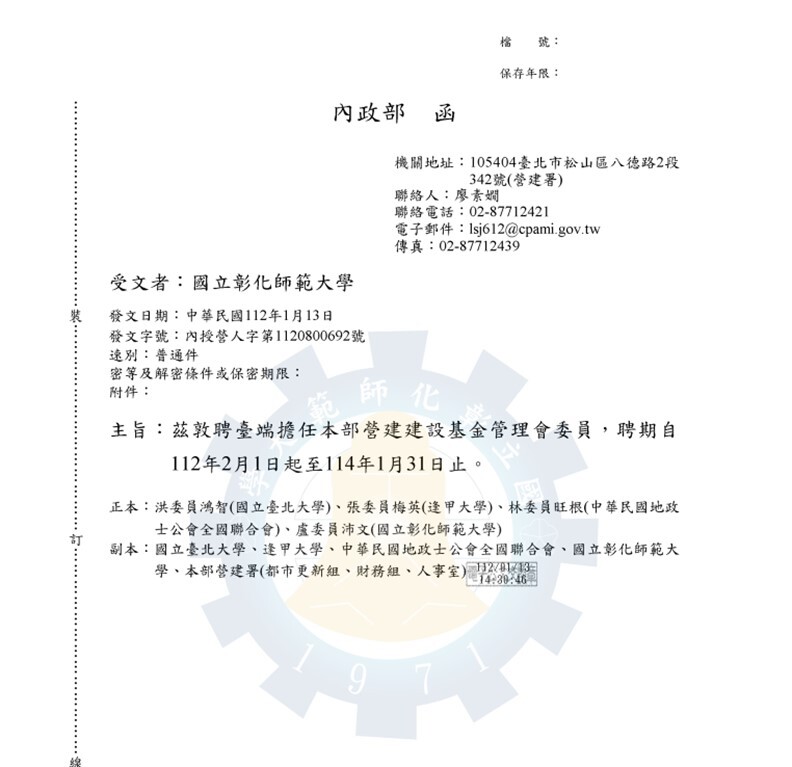
Figure 4: Appointment letter for Associate Professor Lu Pei-wen of the Department of Geography as a committee member of the Construction and Planning Development Fund Management Committee, Ministry of the Interior
(5) Associate Professor Lin Yu-chun from the Department of Accounting serves as a committee member on the Natural Gas Pricing Calculation Method Review Committee, the Ministry of the Economic Affairs. She provides relevant professional opinions for reference by the pricing authorities (Figure 5).
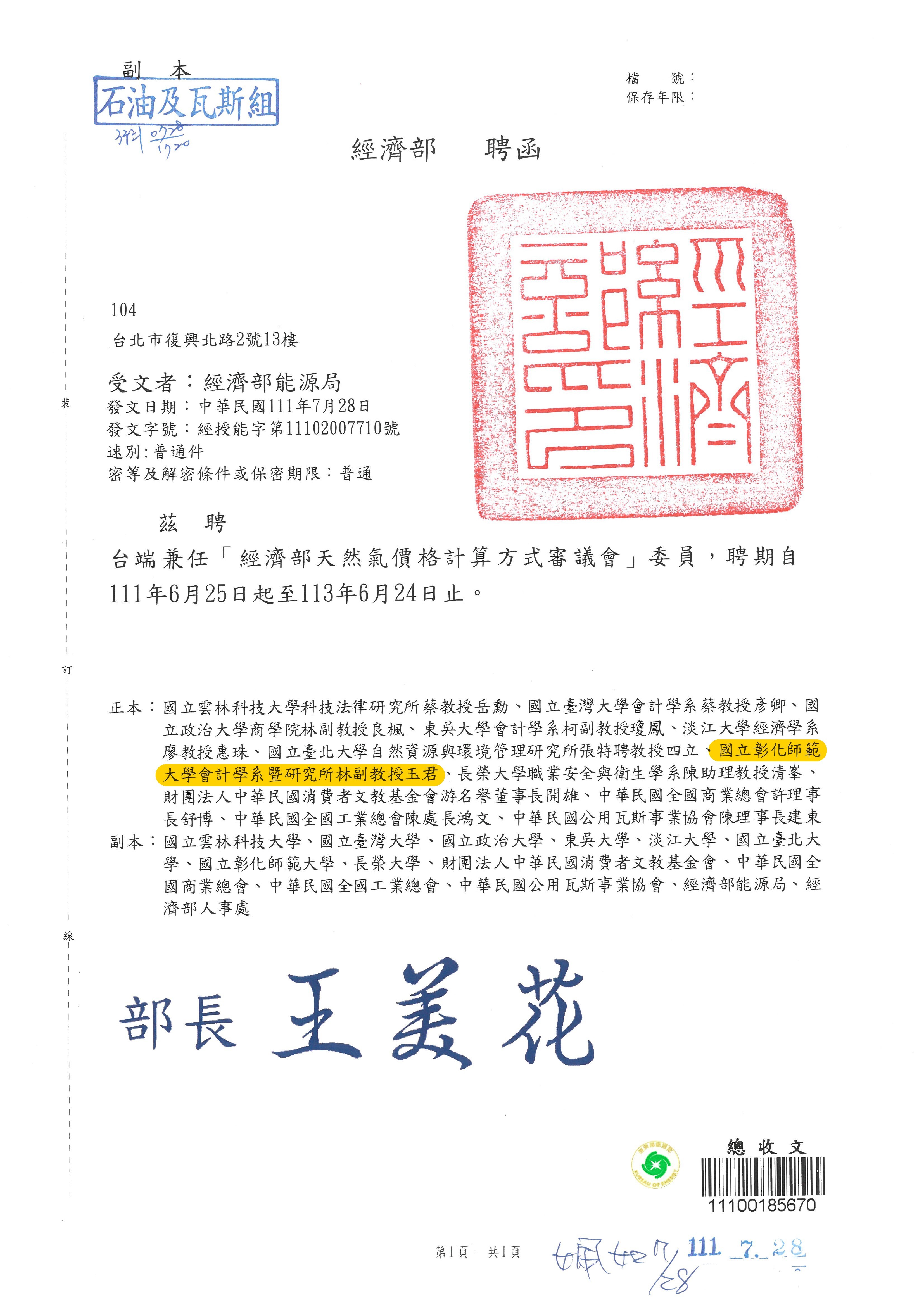
Figure 5: Appointment letter for Associate Professor Lin Yu-chun as a committee member of the Natural Gas Pricing Calculation Method Review Committee, Ministry of Economic Affairs
(6) Assistant Professor Chiang Ling from the Department of Biology serves as a committee member on the Review Panel for First-Time Import of Live Foreign Aquatic Animals under the Council of Agriculture, Executive Yuan. She assists the government in evaluating the potential impact of importing live foreign aquatic animals being imported into Taiwan for the first time on domestic flora and fauna, thereby safeguarding national marine and ecological security (Figure 6). Relevant website:
https://www.fa.gov.tw/view.php?theme=FisheriesAct_RULE&subtheme=&id=463&font-size=l
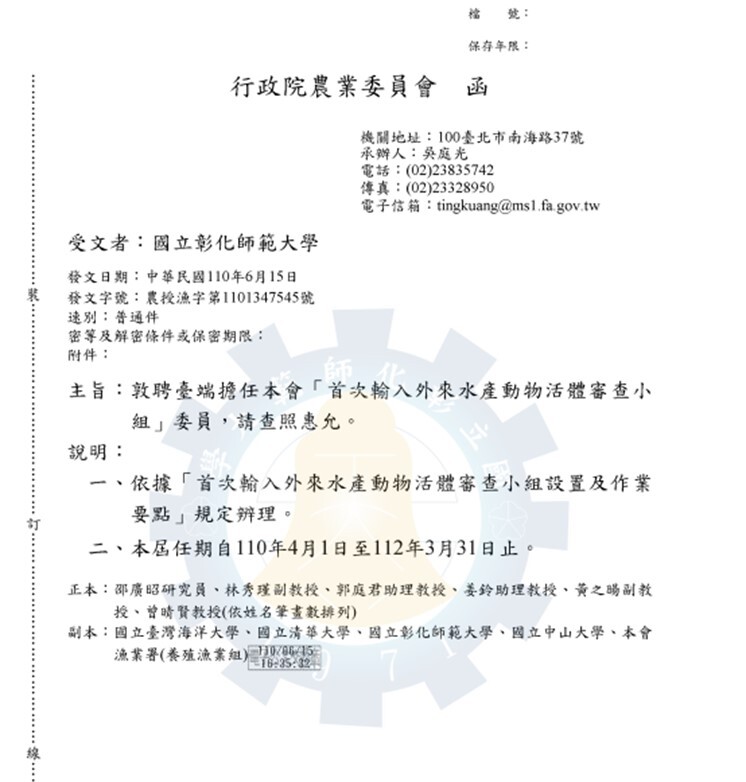
Figure 6: Appointment letter for Assistant Professor Chiang Ling from the Department of Biology as a committee member on the Review Panel for First-Time Import of Live Foreign Aquatic Animals, Council of Agriculture, Executive Yuan
(7) Assistant Professor Chiang Ling from the Department of Biology serves as a member of the 2nd Marine Wildlife Conservation Advisory Committee of the Ocean Affairs Council. In this role, she assists the government in consulting and discussing matters such as:
Evaluating and classifying the list of protected marine wildlife species.
Approving the designation, modification, or abolition of marine wildlife protected areas.
Approving land use and revenue methods within marine wildlife protected zones for major national construction projects, under the principle of not affecting wildlife survival.
Providing consultations related to the protection of marine wildlife habitats, resource rehabilitation, and conservation.
These efforts aim to safeguard national marine and ecological security (Figure 7). Relevant website:
https://www.oca.gov.tw/ch/home.jsp?id=361&parentpath=0,296,360
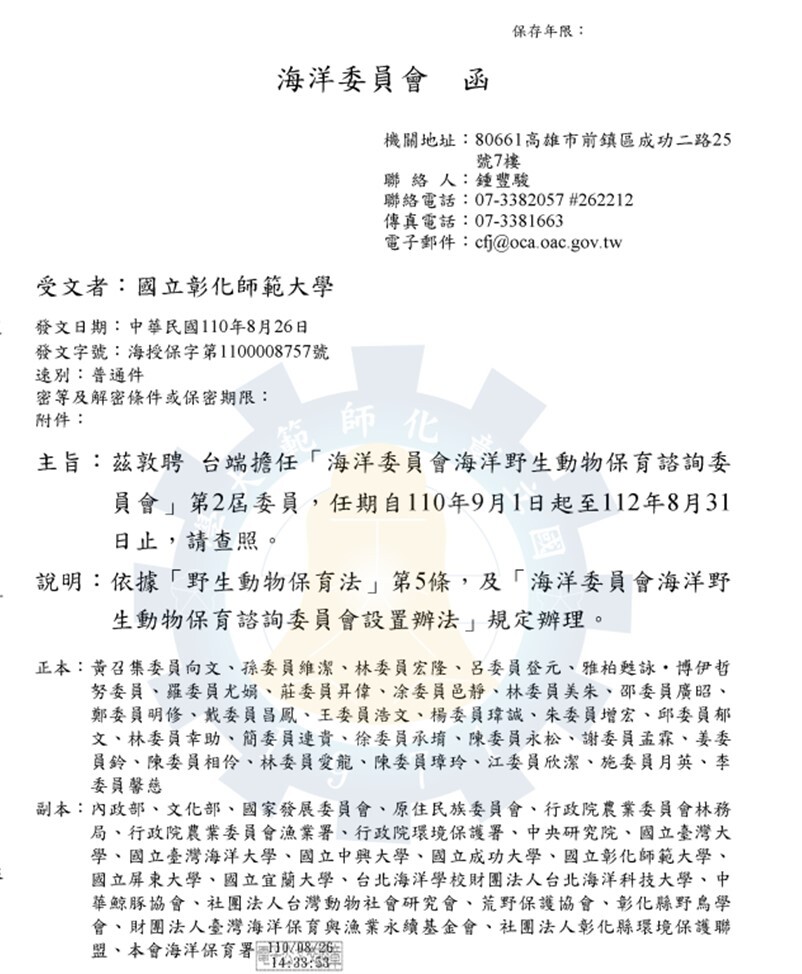
Figure 7: Appointment letter for Assistant Professor Chiang Ling of the Department of Biology as a member of the 2nd Marine Wildlife Conservation Advisory Committee of the Ocean Affairs Council




